Charting journey of a superstar Saif Ali Khan who's constantly upgraded like a web app!
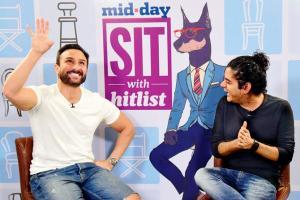
Saif Ali Khan
This is the first edition of Sit With Hitlist held outside our midday office-studio. Guess it had to be with Saif Ali Khan. For, besides a superstar, Saif is also a 'Nawab'. And when the Nawab summons, well, you show up! That said, it's only fair that we begin this conversation with Saif, negating a rather popular notion. Which is...
ADVERTISEMENT
You get called the 'Nawab', which inheritance-wise, you are [of Pataudi]. But the fact is you're actually a self-made actor, having taken nothing from parents, ever since you moved to Bombay, at 20!
Yes, thank you. I've learnt that you cannot argue against narratives — whether or not they're true. People have a certain fixed notion. For that matter, even [with] Pataudi [palace], when my father [Mansur Ali Khan Pataudi] died, it got rented to Neemrana Hotels. Aman [Nath] and Francis [Wacziarg] used to run [the hotel]. Francis passed away. He'd said that if I wanted [the palace] back, I could let him know. I said: I want it back. They held a conference, and said, okay, you have to give us lots of money!
Right.
Which I then consequently earned. So, even the house I'm supposed to have inherited has been earned back through money from films. You can't live off the past. At least we can't in our family, because there was nothing. There is history, culture, beautiful photographs; and, of course, some land. It has been a privileged upbringing. But there's been no inheritance.
Watch the full Sit with Hitlist interview with Saif Ali Khan:
You moved to a rented apartment in Bombay, is that how it worked?
I was born and even raised in Bombay. My father lived with my mother in her [Carmichael Road] flat; I went to Cathedral, spent time in Bombay Gym — in a world more influenced by my father's, than films.
He had just finished playing cricket. His last Test series was when I was four/five. My mother [actor Sharmila Tagore] says he was bunking his responsibilities. His mother was looking after things in Bhopal and Pataudi. She'd got old. So we moved to Delhi to live with her.
It was a nice, big old house in Delhi, which she had been given for her lifetime, in return for land, property and other kinds of deals that these old [royal] families had made with the Indian government.
That'd be 1971 [when privy purses were abolished], right?
1971, exactly. So, that's why we moved to Delhi. I had fun. That was the generation of designers like Rohit Bal, Rohit Khosla, Ashish Soni… These were the first people I came across, doing something off-beat, in terms of art, culture. Which might have planted a seed [within me] to go and act in films!
You did start off with an ad.
My father sent me to an ad agency to get a job, because I was partying a lot.
Where were you partying?
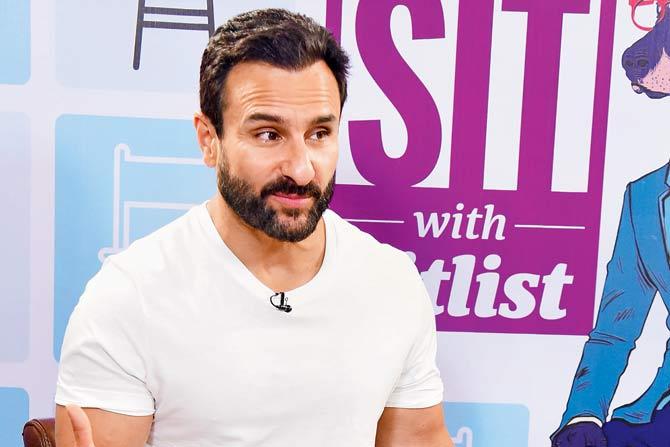
In Ghunghroo [discotheque at Delhi's Maurya Sheraton]. It was fantastic. My father put me on a bus to an ad agency in Sunder Nagar. One of my jobs was to make religious calendars for Birlas. The only creative [call] was whether we should put Lord Vishnu in October, or November. I soon lost interest!
And the Gwalior ad happened?
Which, again, had to do with my father. My parents were shooting a Gwalior ad together. Honestly the way my upbringing was, the kind of life I'd had, or lack of confidence — I wasn't a cinematic figure, in terms of being shot in photos. I was effeminate, coy, shy, unsure, worst qualities for a...
A leading man?
As an actor in Bombay, yes. But not bad for a western, academic school-boy. That was a different culture altogether. So some quick learning was required.
And then you moved to Bombay. Where did you first rent a place?
In Lokhandwala; a building called Red Rose One. It was a small flat with cane furniture. The producer's daughter had very kindly done it up for me. Until one night I came home with friends, and couldn't open the bedroom door. She had locked it. I think she had a plan. There was a big gap between the door and carpet. I peeped from under, and could see her lying like a whale on my bed. And I thought I'm not going in there. So we went out again!
You began your career pretty much by yourself, and it was, I hear, a disastrous start! Take us through it?
So I went to a really academic, school — the oldest in England — Winchester. The idea [of being there] was obvious. You go to Oxford [or a similar place] thereafter. That hadn't worked out. I was in the black books of my parents, what with Delhi, partying and Ghungroo. I was getting scared. Because there was nothing I was interested in.
After the Gwalior ad, when [director] Anand Mahendroo mentioned a film [to me], bells started ringing. The thought of moving to Bombay sounded so exciting. I remember having that shower in Delhi, in that old house, which had funny water [plumbing], it wouldn't work half the time, and I'd fiddle with it, too hot or too cold…
Saif, you're digressing.
Sorry. Chipkalis [lizards] on the ceiling. Okay, stop! I remember that shower and being excited about a kind of life I could see — coming to Bombay, struggling, little rented flat, films, meeting people, collaborating… It is the only job that, from 18, when I started considering it seriously, I've always been passionate about.
Were you not a movie buff?
Yeah, but a western, as in American, movie-buff. When I was young and my mother [Sharmila Tagore] was an actor, I'd see her crying on screen. It's not something I enjoyed. Hindi films in the '70s were also overtly emotional.
So, Anand Mahendroo...
He offers me this movie, and comes to Ghungroo. I tell my friends, "Hey guys, this is my director..." He has a couple of vodkas. The same guys tell me, "Bro, your director friend is in the bathroom [throwing up]!" I should've realised we were in a bit of trouble. We came to Bombay. Sattee Shourie was our producer. Then somebody told me a story about an ambitious film she had made called Farishtay [1991] with Vinod Khanna. There were panthers chasing him in a shot in that film. She ran out of money during shoot. In the same scene, when he [Khanna] comes around the corner, there are no panthers. Because no money. So, she got some dogs, and painted them black. This is after she had been kidnapped by a cab-union driver!
That was your first producer!
Yes, she used to pay me Rs 1,000 a week. And I'd have to kiss her 10 times on the cheek. Anyway, she had a fight with the director, and I got saved. Because the film got shelved. Then, Rahul Rawail cast me in his film.
And that was a disaster too?
Kamal Sadanah was in the movie. So he [Rawail] threw out Kamal, and took me — for no fault of Kamal's. And then found out that I was worse, and threw me out. And took him!
Apparently you showed up drunk on set, slept off...
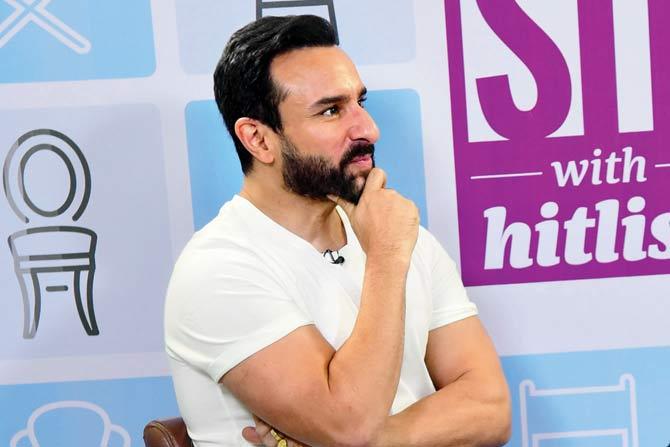
You've done your research. But no, that's not true. Nobody turns up drunk on set. I was just not subservient, sitting around all day. There could've been some attitude problem, which I myself wasn't seeing. I [probably] didn't understand how serious things are. You might come across as really cocky, because you think it's really funny, when it's not.
Did you make friends easily in Bombay though?
I did. Many of them are producers now. Some of them are in LA. I remember Dileep Singh Rathore [Hollywood production manager for Blood Diamond, The Dark Knight Rises] and I used to do acting classes together. And we'd get asked to take our shirts off; another guy would do push-ups with his shirt off. All the things [work-place sensitisation]happening lately is good. This crap's been going on forever. Luckily, we were like, no bro, we're not doing this.
And then you finally debuted with Yash Chopra.
It is personal and I don't want to dwell much on it — I also ran away from home, and got married at 20. And I've to give Amrita [Singh], my ex-wife, credit for being the only person who taught me to take it all [work/show-business] seriously. She said you can't hit the target while laughing at it. That's when Parampara happened.
Yashji called to say he was looking for a fourth lead, or something. I was like, great; yeah, anything. I'll do it. It's like investment in stock—if Yash Chopra is taking him in Parampara, [the industry believes] let's invest in this. For me, it was as simple as, this has to work. There's nothing else. That focus was required. And taught to me, and I inculcated.
If we watch retro Lehren [video-magazine] interviews from back then, it seems like you, now, and that guy are two different people!
I sometimes find myself doing the same stuff. Maybe I haven't changed! But it's an age, and exposure thing. Your upbringing, the culture you're given, and the academic grounding that teaches you to be humble, understated… They come flooding back later. Not when you were trying to fit in — giving gaalis, drinking Bacardi, being one of the boys in the '90s; and then you question: Do I want to be known like that? Or should I be comfortable about how I express? It's true for people. I've read characters in plays that are rebellious, and then embrace everything they rebelled against.
I meant more in terms of the duality between who you were as a person, and what you did [in terms of movies] in the '90s.
For sure. Because you had to fit into a certain mould in the '90s. There wasn't that much room for experimentation. Aamir Khan said he'll do max five films a year, when others were doing 15! Shakti Kapoor said he felt insecure when he didn't have 17 films on floor!
You still had some hits to keep you going though.
This is an organic kind of an industry. Like crude oil, you distil off at different temperatures. So people find their own level. And you need a certain amount of success to survive. So Parampara, the great Yashji film, didn't work. It was his 'safe' film after Lamhe didn't run. Aamir, who did Parampara, got offered Darr. I was the fourth lead. And got offered Yeh Dillagi, a smaller film, with Akshay Kumar also in it. But my role was fun, music was great, so I scored something there.
As a person, did it occur to you that you're not exactly that 'Ole Ole' fellow [from Yeh Dillagi]?
In fact that merge [of sensibilities] is happening now. Which is a sign of some civilisation. Earlier, what you do for a living had nothing to do with what you are [as a person]. The minute we're on set, we are equal; and just part of this thing, and it doesn't matter what...
We know our '90s movies. But can't recall Yaar Gaddar, Dil Tera Diwana, Udaan, Keemat: They are Back, Humse Badhkar Kaun, Suraksha, Aao Pyaar Karein… Can you?
Every single one. Perhaps not the ones you mention, but a lot of these films in that time, had great music. That kind of helped [us] survive. You could be an audio hero. I think, I kind of was — quite presentable doing a lot of songs. As for performance, even a big star said, what is acting? Just say your lines in a sincere fashion! Which is how it remained for the longest. There was also the 'Mr Bachchan' hangover.
Dil Chahta Hai [DCH], in that sense, is obviously Saif 2.0.
I would have to say it is people like [director] Farhan [Akhtar] and Aamir Khan, who were effecting change, and I benefitted. I wasn't sure if I wanted to do DCH. I was the third lead, while playing hero in multiple films. Aamir asked me about films I was hero in. I named them. He said this film [DCH] is about three times the size of all those put together —Can you get on the page, it is good cinema, you have to do it.
But you'd done ensemble and two-hero movies — Kacche Dhaage, Main Khiladi Tu Anari were huge hits.
I grew up watching a lot of WWII ensemble movies, or Dirty Dozen, with various heroes. So when LOC, or a two-hero film happened, I'd think of Bud Spencer and Terrence Hill. In my head there's nothing wrong with it. I've always been happy to compete with the other guy as well. I'm like — you might be the biggest star; but I am going to give you a run for your money. The idea of a buddy-movie was also being liked at the point.
After DCH, there appears to have emerged a certain confidence. How many Bollywood stars have attempted an English film? You did Being Cyrus [2006].
Also, Kalakaandi [2018]. With Being Cyrus, there was the question of the English sounding natural. American is the language of our English. [Director] Homi [Adajania] wanted me to sound a little Indian. We had to get it right. This is what's happening today — guys who basically speak Hindi are better actors. Language is the thing.
But this is when you were doing something new, rather than simply trying to fit in?
This is around the time I got offered a Pepsi ad. Cola commercial was a barometer of success. Both Coke and Pepsi came to see me, when we were shooting Eklavya. I felt like, don't know what's happening! I chose Coke. Because I just like the drink.
You can't tell between the two.
I can.
You should do a blind-test.
Okay, I'll probably get it wrong — even with single malt, and some rubbish. So we were set to sign, somebody said you can't do Coke; we'll throw you out. You've signed up for Lay's Chips, owned by Pepsi. So...
What does that have to do with Being Cyrus?
Well that was the time when things were coming together. I was at the right place, and also looking like the right guy — it was no longer that funny haircut. Films like Omkara and interesting stuff with Yash Raj were coming together.
And you were killing it with the dialect in Omkara. Tough?
Kind of. But despite perception and projection, I am not actually English, you know! I have grown up in Pataudi, which is in Haryana. I have heard that dialect all my life.
Saif 3.0: You turn producer with Love Aaj Kal. I'm told [director] Imtiaz Ali offered you Rockstar first. True?
Yes, that's right! Of all the ideas, Love Aaj Kal just sounded a bit more commercial, although not the way he wanted to make it. He had quite a grim ending in mind, where this flaky guy finally returns to find out that his girl is eight-months' pregnant. We had to plead with him, until when we were on set in London, he said alright, we can have a happy ending!
Which makes sense, because by then you were the quintessential rom-com leading man; Bollywood's own Hugh Grant, as it were.
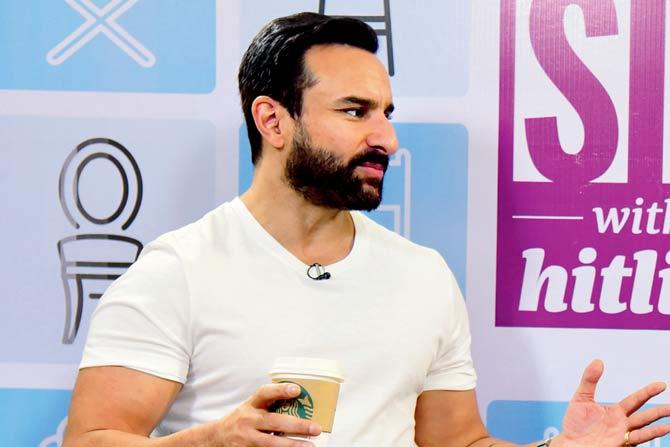
Yeah [Hugh Grant], I've heard Karan Johar say that as well. Don't know where it came from. I remember Aditya Chopra telling me that he's got Shah Rukh Khan, who's the king of box-office. That there's this thing called the 'multiplex hero' coming up. And that he's trying to get a handle on it. And he thinks that I could be that multiplex hero, because I'm a little different. Cast correctly, I should hit that genre. So he started making Hum Tum, Salaam Namaste.
Rom-coms seem to have died altogether. In Hollywood, it's all Marvel anyway. And here…
My wife [Kareena Kapoor] told me that that genre has changed into [films like] Badhaai Ho. Don't know if true. Think she means the lead character, trying to figure out life in New York etc., is passé. Also, confusion, being unsure, a bit of a mess, is the hallmark of the rom-com hero. Because there is no villain. Villain is your flaky self. Which, maybe, doesn't fit well, when you're supposedly more grown-up. Maybe she [Kareena] just doesn't want to see me like that!
Still with [producer] Saif 3.0, you did a zombie-comedy [Go Goa Gone] in Bollywood —spoof/subversion of a genre, while we hadn't had a proper zombie film!
It seemed like a good, entertaining idea. Frankly I don't think I'm a great producer. What I love might not be everybody's cup of tea. A great producer can tell: Okay, this is a joke, as in an amazing, four-line anecdote; not a film. Or this is a film. Or this is a short-story/book. He can sort out different mediums. Within films, he should also be able to tell at what budget that story should be made. Don't think I have that ability.
[Referring to Sriram Raghavan's] Agent Vinod, that you wanted to make?
I made a mistake. I thought Jack Bauer from 24; so why not an Indian Agent Vinod? Apart from a complicated script, we missed out on the character's 'Indianness'. This guy was looking bit too western — dinner-jacket, suaveness. He should've been wearing chashma, holding a ball-pen...
Did you decide to shelve the film during its making?
No, again, Dinesh Vijan was [co-]producing. He is good at balancing stuff. What had happened was that we were shooting at a heritage site —action-sequence, with machine guns and all. We needed to blow up stuff. So we said, okay, there are a couple of beautiful, medieval temple structures...
No!
Of course not! We built replicas 100 yards away. The people there went nuts, suggesting that we were blowing up the complex. They stopped our shoot. We had to reschedule, scrap what we were doing, etc. But we managed.
Curious to know, why did you name your company Illuminati? Anything to do with the conspiracy-theory about a society of elites that secretly rules the world?
No. There was something about illumination and light. There's also the fact about Illuminati being a group of people, including Isaac Newton etc, who questioned authority of Church and talked about importance of secular knowledge. But, ultimately, 'Illuminati' is to illuminate. And that is what a film projector does. Johnny Depp had a production company called Infinitum Nihil —'nothing is impossible'. And I used to look up to him. Now he's been replaced by Tom Hardy.
Why did you and [your co-producer] Vijan part ways?
Because Dinesh Vijan is on his way to becoming a big film-producer. I wanted someone to run my production company. Which is fair. That's why people usually leave. I don't want to make films for 20 other people. I see myself as more of an actor.
In Cocktail, you did offer the lead role to other people.
We did. I only stepped into Cocktail, because Ranbir [Kapoor] and Imran [Khan] didn't want to do it. So I said, okay, I'll do it. They should remember that.
Stepping into Saif 4.0: Your entire career put together would be the polar opposite of the subdued Sartaj Singh from Sacred Games [on Netflix]. Conscious call?
It's got a lot to do with [director/show-runner] Vikram Motwane. On Day One, we were in Madh Island. Distance wise, this was painful for me, before the ferry, I realised…. Okay, I digress.
Right.
So I was doing an investigation scene. And he [Motwane] said, cut, and just told me to bring my energy levels down: "You're too hyper!" It was a different kind of communication from anything I had done before — the feeling of trusting the camera, and not showing what you feel. It was the first piece of film I had ever worked on with that thehraav.
You've been talking about unlearning, reading acting books etc, something you didn't do before.
But before that, a little bit of background. Which is about the way we were brought up in the movies. I don't know about Dilip Kumar Saab, and Amitabh Bachchan. But after the '60s and '70s, there was a creative slump, where the attitude with cool guys was: We don't talk about acting, work… Who learns lines? It was like how we used to laugh at nerdy kids in school. People used to wonder why Aamir is taking things seriously—there was just this whole attitude of 'unseriousness'. There was a glamour and starry vibe. It certainly wasn't about prepping for work, which has changed.
You were the first Bollywood star to green-light a web series. And you said no to Homeland, is that true?
Well, I was asked to read for Homeland, which I did, and then asked to come down to LA or New Zealand to read some more. I could have pursued it more aggressively. But I was busy here. I remember [daughter] Sara [Ali Khan] helping me a lot, people getting excited. But it wasn't a great part. It wasn't the main lead. The part went to an Etonian [Damien Lewis]. Now you can't have a Winchester boy playing [second fiddle to an Etonian]!
Would Sacred Games be the first time your school-friends watched your work?
Yes, good point. And they are quite academic, and say things like, it's really interesting that a Muslim guy plays Sardar, and in this kind of world, that's good contribution!
(Audience) Pacing of Sacred Games 2 came under question. What did you make of it?
I didn't like the second season as much as I liked the first, which was the newest and most interesting thing I had ever seen on TV, from any country. It was a mafia show with a disturbed cop. But it [Season 2] became a bit esoteric and slow, with the treatment of the guru with Gaitonde.
'I did not like Sacred Games Season 2,' reads like a headline!
But, you know, I didn't. We were in England. It was my birthday [when the season dropped]. Five of us had rented a country-cottage, including a South American book publisher friend of mine, who also speaks a bit of Hindi, loves different cultures. We opened a bottle of Champagne, got Netflix on...
That was your premiere.
Yes. We didn't even tell Kareena. And we sat. After a while I said, okay, I'll watch this on my own later. That didn't happen with Season 1. I shouldn't probably say this.
(Audience) In [Raghavan's] Ek Hasina Thi [EHT], you play the most believable f***boy. How did you pull it off?"
I was just happy to play something cooler, and darker. I'd liked Alain Delon movies, of a doomed bad-boy, on the wrong side of mafia…
Alain Delon, for the uninitiated, being the great French actor.
My mum's favourite. They took him to Hollywood to become James Dean. He said he couldn't be bothered to learn English. Only the French can do that!
What happened in the second half of EHT, though. You think it went a little berserk?
It did. Sriram and I have gone berserk a couple of times [laughs]. And then he does Andhadhun [without me]! I don't mean to sell Sriram out, but he paints himself into a corner, and then tries to write himself out of it. Which is great. But might not always work, although the good stuff about EHT outweighed...
The first half was killer.
Yeah.
(Audience) You've often gravitated towards morally corrupt characters. Does that give you more room?
I'm just interested in those situations, more than glory of God. Hrithik, for example, suits a Ram-like character.
What role did you play in Hum Saath Saath Hain?
Krishna — he's a naughty little version. Salman was Ram. I found it exhausting. One of the most tiring things is to be so happy and positive all the time. And Sooraj-ji [Barjatya] used to say, "Do it your way. But smile!"
How different is it to work with, say, Abbas-Mustan, from Sooraj Barjatya?
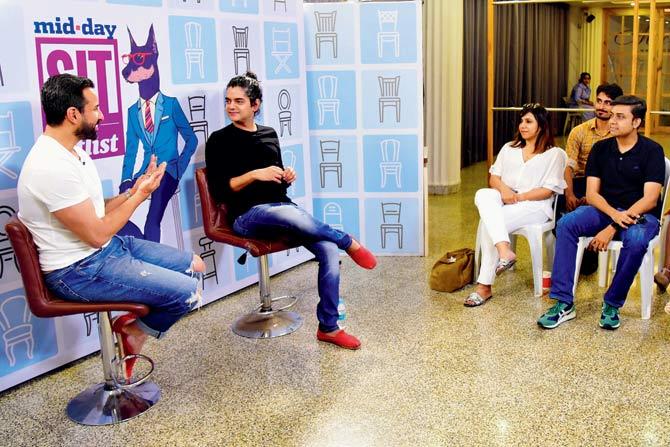
It took me a while to figure out Abbas-Mustan. Mustan Bhai would give instructions. Abbas Bhai would just keep saying, "Kamaal hai, kamaal hai." Then there's Hussain Bhai, the third brother, who is unsung — one of the best editors. He probably contributed the most to films like Race. They'd start shoot at 10 am, wrap at 5 pm. Love these guys, easiest shoot ever.
They never shoot nights.
They just can't. Then Akshaye Khanna told me that I was behaving like a star with them. That I'm not hugging them enough. That I should hang out, and give them more love!
I went to their room at Hilton, in South Africa. There was a white sheet on the floor they were sitting on, and having whiskey and peanuts. They asked me to join in. I sat there for a bit. At some point, they told me I don't have to do this [socialising], if I don't want to — just turn up on set, do my bit. That was great relief. We got along really well after. With Sooraj-ji, I just remember the sheer number of people coming to see him on set, touching his feet — from top heroine to struggling actresses.
Just to say hi on set?
In the most charming way! I remember Rekhaji coming to see him, and she's senior. That's power. And distributors would throw themselves at their feet on set, asking when's the film out, that there's a drought in theatres. They [Barjatyas] were the princes of the film industry. I remember Salman telling Sooraj-ji [about HSSH], "Do you think you'll give a hat-trick? It's quite rare." And I'm like, God, who talks to him like that! So, Abbas-Mustan and Rajshris are different sides of a coin.
Can't imagine Barjatyas on the floor, with booze and chakna.
Definitely, around the table, eating together. No, drinking, that's impossible!
Last question: You've been vocal about issues all along. But when the #MeToo movement happened, it seemed like you didn't say much, or anything; especially given that the head of the company managing you was accused.
But I said so much about #MeToo. Never heard? It's disgusting to make a workplace hostile. Whatever is happening is really good. I don't think there's any smoke without fire. But sometimes they [survivors] have to come forward. You have to. And we have to support these women. [At the same time] a guy's career can be destroyed, without any proof. So there are two things. You've got to be a little sure, before you destroy somebody, in any way. Also, whether it is a sign of our culture — we take down one or two juicy targets, that nobody really minds plucking out. Nobody touches the big boys! I don't know how civilised that is.
Catch up on all the latest entertainment news and gossip here. Also download the new mid-day Android and iOS apps to get latest updates
 Subscribe today by clicking the link and stay updated with the latest news!" Click here!
Subscribe today by clicking the link and stay updated with the latest news!" Click here!







